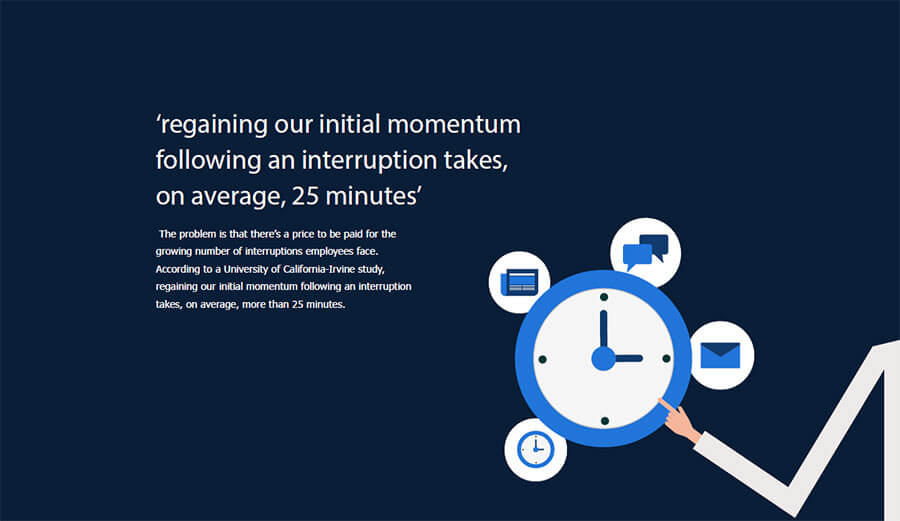Just How Much Do the Demands of Multitasking Cost Us?
Today’s workplaces place ever more demands on your multitasking skills. What are the real costs of multitasking and how can you minimise them?
The Cost of Multitasking
In a recent survey of UK workers it was found that only a third of all employees are actively using strategies to manage multitasking interruptions.
Yet, in the same survey, it was claimed that these interruptions occurred at least six times every day.
If you can, could you hold that thought for a moment please?
A separate University of California-Irvine study found that regaining our initial momentum after an interruption takes, on average, more than 25 minutes.
Now, if you are able, let’s marry these two together to work out just how much time is being lost every year due to multitasking demands and our inability to meet them.
You see: multitasking is not easy, is it?
Thankfully, in the infographic from human resource consultants and recruitment specialists Randstad UK, the maths has been done for us.
It is estimated that the country’s permanent work force is now losing over one billion working days’ worth of productivity every year as a result of multitasking.

Going Off-Grid
You can find a host of other fascinating facts about multitasking in the modern workplace in the infographic here, but what can you do to address the problem?
Mark Bull, Randstad UK’s CEO comments that:
“Going off-grid for half an hour will boost your productivity – it’s easier to concentrate when you’re not continuously fending off mental cravings to check your phone or look at your Twitter feed.
“Alternatively, you can read reports, articles and other documents one after another. Book in meetings back-to-back and, if possible, try limiting email to two or three set times a day instead of responding to them the moment they arrive.
“Of course, that still won’t stop colleagues interrupting you – but it’s a start.”
Let’s take a look at three ways you can more effectively cope with the demands of multitasking.
Three Ways to Boost Your Productivity
According to cognitive psychologists, we shouldn’t believe the hype: no-one is good at multitasking. This is Art Markham, author of Smart Thinking:
“Effective multitasking is an oxymoron. The human brain doesn't actually multitask: what it does is what I call time-sharing."
The fact is your brain can only think about one thing at one time.
It can shift rapidly from one to another, and this is what we call multitasking, but only with a loss in performance for all tasks concerned.
In order to produce quality output in a distraction-filled office, you need to organise not multitask.
1. Group your work
We like to think of our brains as high-tech circuitry. Actually they are more like dynamo lights: great once going but they take a while to warm up.
When you start to work on a task, your brain sets in motion all the connections and neurons needed for it. If you change tasks it has to heat up a new set. This causes an inevitable dip in productivity.
By grouping tasks you can be working at your most efficient: your working lights will be fully on.
2. Get with the programme
Without a visible to-do list the dead bodies rather than the live projects always tend to float to the surface. To stay on top of what is important to you, post up a to-do list that is ranked by priority.
Do not let the chaos of the office environment determine your workflow. It should not always be the wheel that squeaks that gets your elbow grease.
3. Soak it up when you are empty
Think of a sponge: it just can’t take in any more when it is full of water.
Multitasking also impacts on your memory in the same way. It’s difficult to take in or process new information in the heat of a busy workday.
Take the chance to review important notes or documents in quieter times – on your commute or in downtime before lunch.

The Multitasking Challenge
The challenge of multitasking is very real.
Hopefully these three strategies will help you to meet it. Of course, that’s assuming you weren’t busy doing something else as you read them!
Further Reading from Skills You Need
The Skills You Need Guide to Personal Development
Learn how to set yourself effective personal goals and find the motivation you need to achieve them. This is the essence of personal development, a set of skills designed to help you reach your full potential, at work, in study and in your personal life.
The second edition of or bestselling eBook is ideal for anyone who wants to improve their skills and learning potential, and it is full of easy-to-follow, practical information.
About the Author
This article and the infographic are supplied by Randstad UK, part of the world’s second largest HR services organisation. With over 2,000 employees working in over 280 locations across the UK, their mission is to help businesses connect with the best talent in the market and to help people make the right career moves.
Continue to:
Avoiding Procrastination
Time Management


